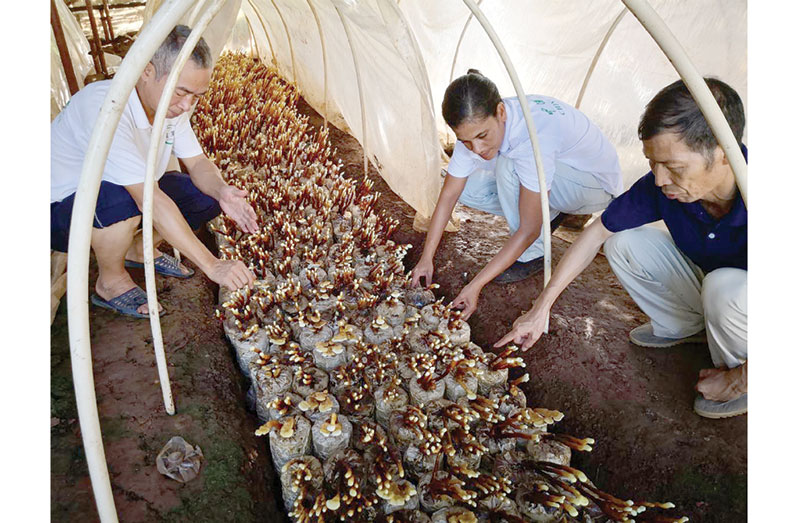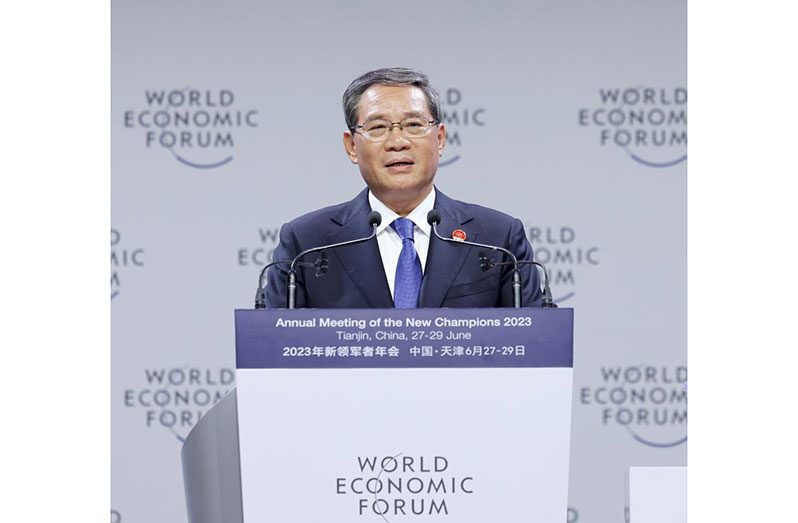–initiative hailed as ‘effective tool’ for building international consensus on growth
DIPLOMATS, officials and scholars from around the world said the tangible, accessible benefits that their countries have enjoyed are a great testimony to China’s capability to deliver on the Global Development Initiative.
They made the comments as Saturday marked the anniversary of President Xi Jinping hosting the High-level Dialogue on Global Development on June 24 last year.
At the landmark event for empowering and realising the GDI, Xi proposed a series of major steps that China will take to implement the initiative, and a list of deliverables was released, including 32 measures covering the GDI’s eight key areas of co-operation.
“We are glad to see that over the past year, with the concerted efforts of all parties, the GDI is delivering real results, with improved co-operation mechanisms, steady progress in key areas, and various capacity-building programs being launched,” Vice-Foreign Minister Ma Zhaoxu said at an event regarding the GDI earlier this month in Beijing.
“It has brought true benefits to all countries,” Ma said.
Foreign Ministry spokeswoman Mao Ning said co-operation in the eight priority areas has advanced steadily, “with a growing list of projects and an expanding pool of development resources, demonstrating good momentum of all-around progress with clear priorities”.
“The GDI has been an effective tool for building international consensus on development and for galvanizing co-operative actions, which has produced many early harvests,” Mao told reporters on Tuesday.
Xi proposed the GDI at the General Debate of the 76th session of the United Nations General Assembly in September 2021.
Currently, nearly 70 countries have joined the UN-based Group of Friends of the GDI, according to the Foreign Ministry.
Many Latin American countries, including Argentina, are among the more than 100 nations and international organisations that have supported the GDI.
Sabino Vaca Narvaja, Argentina’s ambassador to China, told China Daily that the GDI “is a very responsible initiative”.
The GDI and other China-proposed initiatives “have a common view of an integrated world,” and all the initiatives that China has put in the international system are “a very responsible solution” for the entire human community, he said.
This is because they have “a humanistic view, and (have been) focusing on the growth of the people. That is the most important issue for us, too”, the ambassador added.

When meeting in Beijing on June 16 with Bill Gates, co-chair of the Bill & Melinda Gates Foundation, President Xi noted that he put forward the GDI, as well as the Global Security Initiative and the Global Civilisation Initiative, “to provide China’s solutions to tackling global challenges.”
Gates said China has made remarkable achievements in poverty reduction and its response to COVID-19, and has set a good example for the world.
Pick Fung Ho-Chong, ambassador to China of the Republic of Suriname, said that “China has always been a leader” in terms of promoting development.
“With China growing, the rest of the world will definitely grow. This is what I personally think will happen with the leadership of President Xi Jinping, with all that’s been said and the steps that have been taken. It is going to be a definite, positive change in the world’s development in many areas,” she said.
“We are looking forward to joining hands together with the changes,” she added.
Alexander Ayertey Odonkor, an economist and columnist in Ghana, noted that Xi proposed the GDI to “support the timely achievement of the United Nations Sustainable Development Goals”.
“China, through the GDI, is strengthening global development partnerships and promoting stronger, greener and healthier global development. … (It is) a timely action, especially for developing countries, as they struggle to recover from the brutal impact of the COVID-19 pandemic,” he wrote in a recent article published by news portal Modern Ghana.
“Through the GDI, which prioritises development financing and innovation-driven development, Ghana could scale up value-addition, clean energy production and agricultural modernisation, and enhance environmental protection, increase digital connectivity and drive sustainable industrialisation,” he added.
Beijing has been consistently earnest in synergizing the GDI with growth blueprints of other nations and organisations, such as the UN, observers said. This vision should be rolled out with greater global efforts, as the world faces sluggish economic recovery, lingering geopolitical conflicts, climate change, food insecurity and energy crises, they said.
When addressing an Africa Day reception in Beijing last month, State Councilor and Foreign Minister Qin Gang called on China and African countries to better synergize the Belt and Road Initiative and the GDI with the African Union’s Agenda 2063 and the development strategies of African countries.
The goal is “to help Africa accelerate industrialisation, localisation and economic diversification,” he said.
Speaking on future steps for realising the GDI, Ma, the vice-foreign minister, stressed the need to foster greater synergy between the development strategies of countries and organizations.
Beijing will “better synergize development strategies with members of the Group of Friends of the GDI as well as their regions, in particular major development strategies of developing country groups such as the African Union’s Agenda 2063 and the Association of Southeast Asian Nations’ Vision 2025,” he said.
Tang Ying, director-general of the Global Development Promotion Centre of the China International Development Cooperation Agency, told China Daily that the agency will host the first high-level meeting of the Forum on Global Action for Shared Development early next month in Beijing.
The theme of the event will be “Global Development Initiative — Echo the Development Agenda and Call for Global ACTION.”
“We very much look forward to meeting in Beijing with all partners regarding development, and, together with all of them, will discuss major development issues and map out plans on common development,” Tang said.
Ren Lin, head of the Department of Global Governance at the Chinese Academy of Social Sciences’ Institute of World Economics and Politics, said the GDI focuses on tapping into the new driving forces and fresh momentum that could help shore up post-pandemic economic growth.
“It helps to facilitate international co-operation and helps countries catch up with the historic opportunities for technological revolution and industrial transformation,” she said.
“Also, it seeks common development and progress with great quality, drawing a contrast with the pattern of behaviour that seeks a zero-sum game and competes for the limited existing resources for development,” Ren added. (China Daily)
Chinese premier offers insight into how world can navigate tough times
CHINESE Premier Li Qiang, on Tuesday, offered his four-pronged observations on how humanity can navigate the turbulent times, as the world is standing at a historical crossroads.
“I believe that we could draw some very important lessons from the transformations happening in the world in the past several years,” said Li when addressing the opening of the 14th Annual Meeting of the New Champions, also known as the Summer Davos, in north China’s Tianjin Municipality.
Firstly, he called for better communication and exchanges among the international community.
“The absence of effective communication and a lack of comprehensive, holistic and objective perception could easily lead to prejudice and even stereotypes,” Li said.
Secondly, he stressed solidarity and co-operation after the world has experienced the shocks of global crises.
“As a community with a shared future, we must cherish the gains of co-operation, embrace the concept of win-win cooperation, and work together to tackle these global challenges and promote human progress,” Li said.
Thirdly, the premier noted that having gone through the twists and turns of economic globalisation, all countries should cherish openness and co-operation more.
“Economic globalisation is a historical trend,” said Li. “Despite the headwinds and pushback, development trend of economic globalisation has kept moving forward.”
Lastly, the premier said peace and stability should be cherished more in the wake of experiencing anxiety caused by conflicts and instability.
He urged solid efforts to firmly uphold fairness and justice, work hard to solve the security dilemma, and jointly safeguard a peaceful and stable development environment. (Xinhua)
WTO warns of global GDP loss through decoupling and fragmentation
DECOUPLING and fragmentation will be costly for the world, said Ngozi Okonjo-Iweala, director-general of the World Trade Organisation, on Tuesday.
“If we decouple into two trading blocks, it will cost the world a five per cent loss in global GDP in the longer term. The IMF estimates (long-term cost of trade fragmentation could be as high) 7 per cent (of global GDP),” she told a forum on Tuesday during the 14th Annual Meeting of the New Champions, also known as the Summer Davos Forum. The event, themed “Entrepreneurship: The Driving Force of the Global Economy”, runs from Tuesday through Thursday in Tianjin.
“That’s like saying that we lose the equivalent of the whole economy of Japan, which will be catastrophic for the world,” she added. “So, decoupling and fragmentation is something that the world simply cannot afford to have.”
When it comes to the headwinds, Okonjo-Iweala said World Bank research shows that the long-term growth potential of both developed and developing countries, and emerging market economies are declining due to some structural factors like demographics, calling for more efforts to harness areas where there is productivity growth and where young labor can help the global economy.
Despite the challenges ahead, she still sees some opportunities in world trade including the rapidly growing digitally delivered services and the growth potential in green trade. (China Daily)



.jpg)








